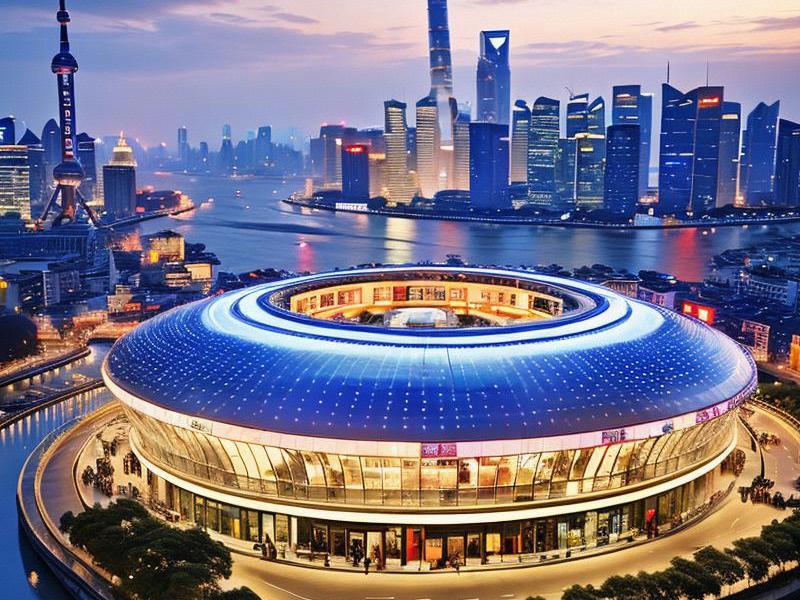
The entertainment industry in Shanghai has always been dynamic, reflecting the city's status as a global financial and cultural center. However, the past decade has seen a significant shift in the types of entertainment available. Gone are the days when the city's nightlife was dominated by karaoke bars and dance halls. Today, Shanghai boasts a wide range of entertainment venues that cater to all ages, interests, and budgets.
One of the most notable trends in Shanghai's entertainment scene is the rise of boutique clubs. These clubs offer a more intimate and exclusive experience compared to their larger counterparts. They often feature live music, DJ sets, and art installations, creating a unique atmosphere that attracts a discerning clientele. For example, The Nest, located in the heart of the city, is known for its stunning rooftop views and world-class DJs, making it a favorite among celebrities and socialites.
Another trend is the integration of cultural elements into entertainment venues. Shanghai's rich history and diverse cultural heritage have inspired many clubs to incorporate traditional Chinese art, music, and cuisine into their offerings. The Bund 18, a historic building overlooking the Huangpu River, has been transformed into a cultural and entertainment complex that includes a theater, art galleries, and a restaurant serving authentic Shanghainese cuisine. This blend of old and new provides visitors with a unique and enriching experience.
Technology has also played a crucial role in shaping Shanghai's entertainment landscape. Smartphones and social media have revolutionized the way people discover and engage with entertainment. Many clubs now offer mobile apps that allow customers to book tables, order drinks, and even interact with DJs through social media platforms. This digital integration has made the entertainment experience more convenient and personalized.
爱上海同城419 The entertainment industry in Shanghai is not just about clubs and nightlife; it also encompasses a wide range of cultural activities. The city is home to numerous theaters, concert halls, and museums that showcase everything from classical music and opera to contemporary art and film. The Shanghai Grand Theatre, for instance, is a world-renowned venue that hosts performances by top international artists and orchestras. Similarly, the Shanghai Museum is celebrated for its extensive collection of Chinese art and artifacts, attracting millions of visitors each year.
In addition to traditional cultural venues, Shanghai has also embraced the concept of creative districts. These areas are hubs of artistic activity, featuring studios, galleries, and performance spaces. Xintiandi, a popular tourist destination, is a prime example of a creative district that combines historical architecture with modern art and dining. It offers a glimpse into the city's rich cultural heritage while also showcasing contemporary creativity.
The entertainment scene in Shanghai is not without its challenges. As the city continues to grow and evolve, there is a need to balance the demands of urban development with the preservation of cultural heritage. The government has taken steps to address these issues by implementing policies that promote sustainable tourism and protect historical sites. For example, the Old City of Shanghai, a UNESCO World Heritage Site, has been carefully restored to maintain its historical charm while incorporating modern amenities.
上海贵人论坛 Another challenge is the competition among entertainment venues. With so many options available, clubs and cultural institutions must constantly innovate to stay relevant. This has led to a surge in creativity, with venues offering unique experiences that set them apart from the competition. For instance, the M50 Creative Park, located in the former M50 textile factory, has transformed into an arts colony that houses over 100 galleries and studios. It has become a haven for artists and art lovers, attracting visitors from around the world.
The entertainment industry in Shanghai also faces the challenge of attracting and retaining talent. The city's rapid pace of life and high cost of living can be daunting for newcomers. To address this, the government and private sector have launched initiatives to support the entertainment industry, including funding programs, training workshops, and networking events. These efforts aim to foster a supportive environment that encourages creativity and innovation.
Despite these challenges, the entertainment scene in Shanghai continues to thrive, reflecting the city's dynamic and resilient spirit. The city's ability to adapt and innovate has made it a global leader in the entertainment industry, attracting talent, investment, and visitors from around the world.
上海花千坊龙凤 The future of Shanghai's entertainment scene looks promising, with new developments on the horizon. The city is set to host several major events in the coming years, including the World Expo and the Asian Games. These events will not only showcase Shanghai's cultural and entertainment offerings but also provide an opportunity to further enhance the city's global reputation.
In conclusion, Shanghai's entertainment scene is a testament to the city's rich history, diverse culture, and innovative spirit. From boutique clubs and cultural venues to creative districts and major events, the city offers a wide range of entertainment options that cater to all tastes. As Shanghai continues to grow and evolve, its entertainment industry will undoubtedly play a crucial role in shaping the city's future, providing residents and visitors with unforgettable experiences that reflect the essence of this vibrant metropolis.
